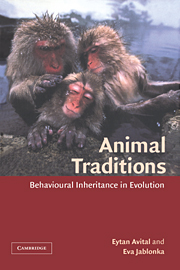Book contents
- Frontmatter
- Contents
- Preface
- Acknowledgements
- 1 New rules for old games
- 2 What is pulling the strings of behaviour?
- 3 Learning and the behavioural inheritance system
- 4 Parental care – the highroad to family traditions
- 5 Achieving harmony between mates — the learning route
- 6 Parents and offspring – too much conflict?
- 7 Alloparental care – an additional channel of information transfer
- 8 The origins and persistence of group legacies
- 9 Darwin meets Lamarck – the co-evolution of genes and learning
- 10 The free phenotype
- References
- Index of species
- Index of subjects
3 - Learning and the behavioural inheritance system
Published online by Cambridge University Press: 28 October 2009
- Frontmatter
- Contents
- Preface
- Acknowledgements
- 1 New rules for old games
- 2 What is pulling the strings of behaviour?
- 3 Learning and the behavioural inheritance system
- 4 Parental care – the highroad to family traditions
- 5 Achieving harmony between mates — the learning route
- 6 Parents and offspring – too much conflict?
- 7 Alloparental care – an additional channel of information transfer
- 8 The origins and persistence of group legacies
- 9 Darwin meets Lamarck – the co-evolution of genes and learning
- 10 The free phenotype
- References
- Index of species
- Index of subjects
Summary
To understand how traditions originate and how they evolve, we must first establish the relationship between learning, memory and social organisation. Not everything that is learnt becomes a habit, not every habit involves social interactions and not every social habit is transmitted across generations. We therefore need to know what learning entails, how patterns of behaviour are memorised and how they lead to the formation of traditions. Our purpose is not to describe the neural mechanisms of learning and memory, but rather to outline the psychological, ecological and social conditions that influence how behaviour patterns are generated, remembered and transmitted. ‘Learning’ and ‘remembering’ are not simple and unitary processes, however: different species rely to varying extents on several types of learning and memory. This affects the nature of the habits they develop, and whether or not and in what manner these habits form cultural traditions. To get a better understanding of the different types of learning and their consequences, we will return again to the Judaean hills and observe the behaviour of some of their inhabitants.
It is late spring, and the dry shrubland of the Judaean hills, with its small oak trees dotted among scattered low bushes and wild herbs, is swarming with life. As the daylight fades away, a female orb-web spider, suspended in mid-air on a thin thread stretched between two flowering bushes, is busy constructing her orb-web. Seed-collecting harvester ants move hurriedly along well-trodden earth roads to and from a nearby underground nest. […]
- Type
- Chapter
- Information
- Animal TraditionsBehavioural Inheritance in Evolution, pp. 63 - 104Publisher: Cambridge University PressPrint publication year: 2000



